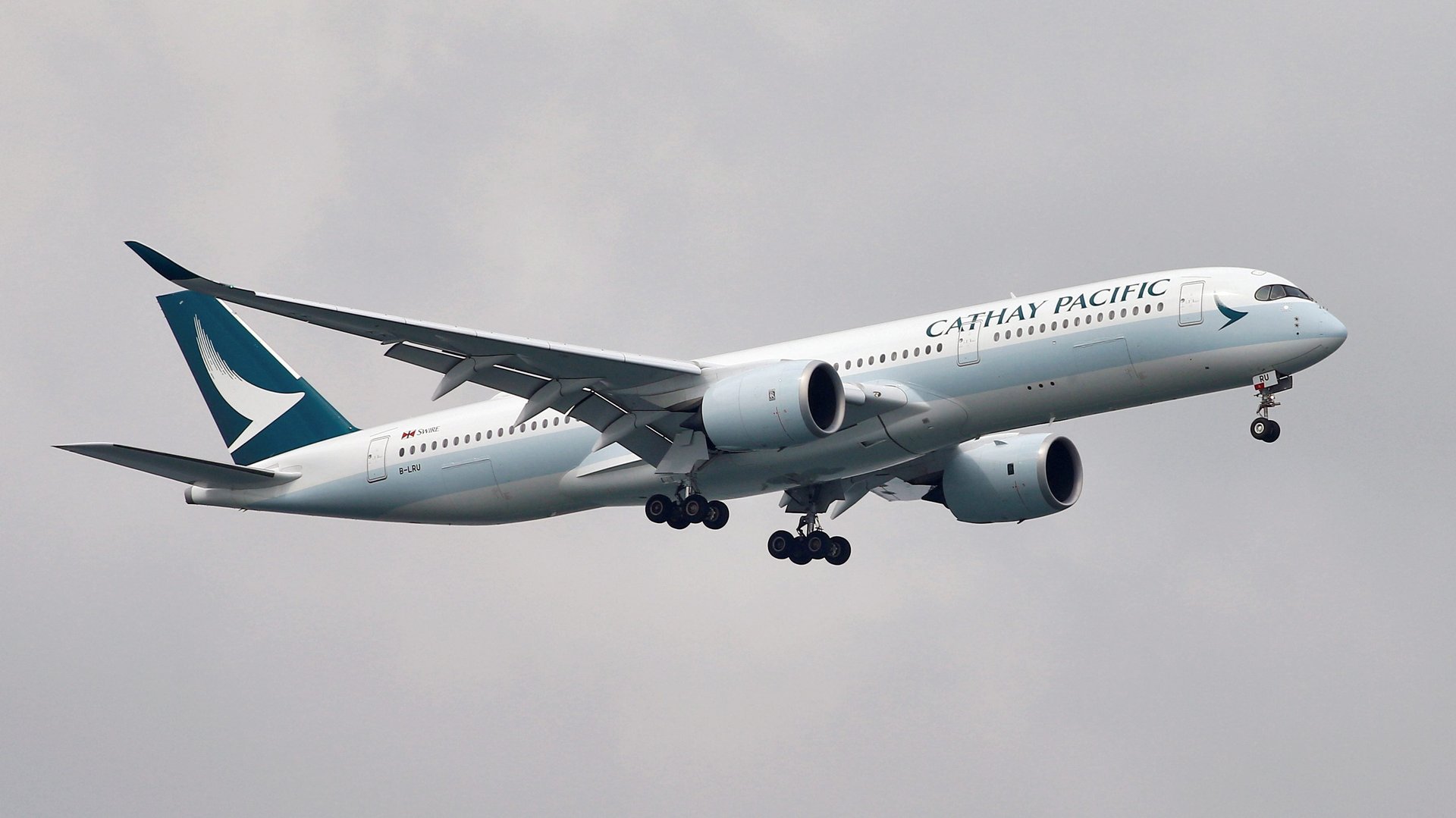Hong Kong bans passenger flights from the UK
From Thursday (July 1), passenger flights from the UK will be banned from landing in Hong Kong under new regulations to limit the spread of coronavirus.


From Thursday (July 1), passenger flights from the UK will be banned from landing in Hong Kong under new regulations to limit the spread of coronavirus.
The Hong Kong government said today (June 28) that it would add the UK to a list of “extremely high-risk” countries, which means that people who have been in the UK for longer than a 2-hour layover can no longer travel to Hong Kong. The UK was put on the list in Dec. 2020 but taken off it in May as the local pandemic outlook improved thanks to a successful vaccination drive.
While Hong Kong is not the only government to restrict travel from the UK because of the Delta variant, this latest decision also has geopolitical implications. It comes against the backdrop of historically high tensions between the UK and China over the status of Hong Kong, and a concerted push by the Hong Kong government to dissuade its population from moving to the UK.
Why did Hong Kong ban flights from the UK?
Many countries have restricted travel from the UK because of the spread of the Delta variant of SARS-CoV-2. The variant is more transmissible than others and was first identified in India, but it has spread rapidly in the UK. According to the World Health Organization, it is “well on its way” to accounting for a majority of worldwide cases of Covid-19.
The travel restrictions were implemented under a mechanism known as “place-specific flight suspension,” which triggers a ban on travel from countries if:
1️⃣ Five or more passengers tested positive for Covid-19 upon arrival in Hong Kong from the UK with a mutation that is present in several common strains of SARS-CoV-2 or other “relevant virus mutation[s].”
or
2️⃣ 10 or more passengers tested positive for Covid-19 upon arrival in Hong Kong from the UK or during quarantine in Hong Kong from the UK with the same mutation as above or other “relevant virus mutation[s].”
The political implications of a Hong Kong-UK travel ban
Activists worry that Hong Kong’s ban on flights from the UK could interfere with the planned migration of Hong Kongers wishing to avoid the territory’s increasingly restrictive politics.
In July 2020 the Chinese government imposed a national security law on Hong Kong that has muzzled the free press and all but criminalized political opposition. In response, the UK, which colonized Hong Kong until 1997, opened a pathway for Hong Kongers born before that date and their families to migrate to Britain under a new program known as the British National Overseas (BNO) visa scheme. (Those who are eligible already had access to a BNO passport, which gave them the right to visit the UK visa-free for up to six months, but not to live and work there.)
The take-up for BNO visas has been high so far: In the first two months of the scheme the Home Office received 34,300 applications, of which 7,200 were granted. Six in 10 came from people residing in Hong Kong and the rest from people already in the UK.
But the Hong Kong government is making it more difficult for people to take advantage of this scheme. In January it said it would no longer recognize BNO passports and asked some other countries to do the same. (Though China agreed to recognize the documents as legal proof of identification under an agreement with the UK to hand over Hong Kong, Chinese Foreign Ministry spokesperson Zhao Lijian said that “The British side’s attempt to turn a large number of Hong Kong people into second-class British citizens has completely changed the nature of the two sides’ original understanding of BNO.”)
The Hong Kong legislature also passed an immigration law that will come into effect in August, which experts have warned could lead to the kinds of selective exit bans that happen in mainland China. (Hong Kong officials deny that is the case.)
The travel ban only applies to incoming passenger flights from the UK, not outgoing ones. But some activists speculated on social media that it could have an indirect effect on flights from Hong Kong to the UK—and the Hong Kongers wishing to leave—by making the direct route from Hong Kong to the UK less economically viable for airlines such as Cathay Pacific and British Airways. (In an email statement, British Airways said that it was “naturally disappointed by the Hong Kong government’s decision,” but that its Hong Kong to London service “will continue to operate on a daily basis.”)
Hong Kong authorities say this is merely a public health measure. In an email to Quartz, an officer from the Security Bureau, the government body that oversees customs and immigration, reiterated Hong Kongers’ right to free movement, and said that “Whether individual airlines will maintain their flight service from Hong Kong to the UK is a commercial decision.”
The UK’s Foreign, Commonwealth, & Development Office has updated its travel guidance for Hong Kong.
This post has been updated with comment from British Airways and Hong Kong’s Security Bureau.